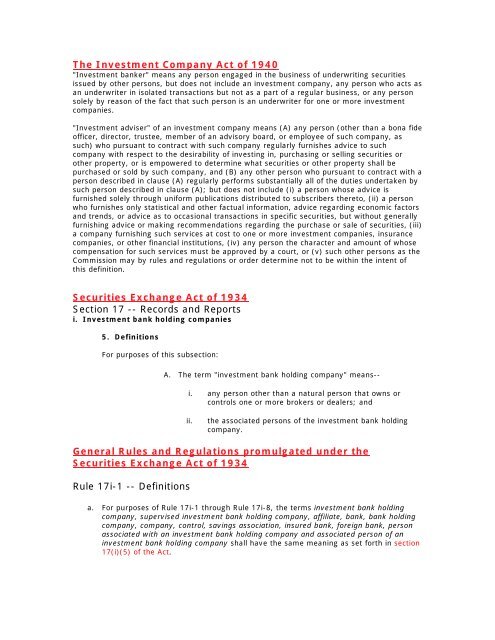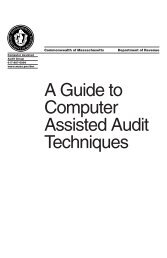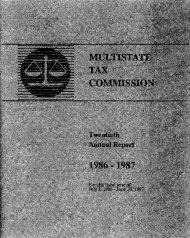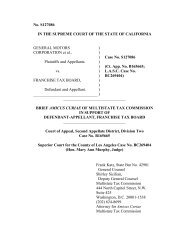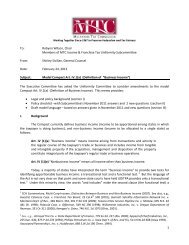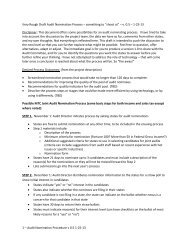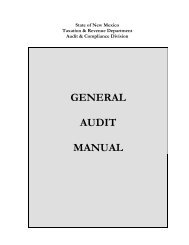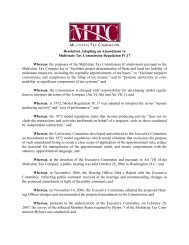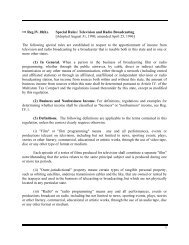The Investment Company Act of 1940
The Investment Company Act of 1940
The Investment Company Act of 1940
- No tags were found...
You also want an ePaper? Increase the reach of your titles
YUMPU automatically turns print PDFs into web optimized ePapers that Google loves.
<strong>The</strong> <strong>Investment</strong> <strong>Company</strong> <strong>Act</strong> <strong>of</strong> <strong>1940</strong>"<strong>Investment</strong> banker" means any person engaged in the business <strong>of</strong> underwriting securitiesissued by other persons, but does not include an investment company, any person who acts asan underwriter in isolated transactions but not as a part <strong>of</strong> a regular business, or any personsolely by reason <strong>of</strong> the fact that such person is an underwriter for one or more investmentcompanies."<strong>Investment</strong> adviser" <strong>of</strong> an investment company means (A) any person (other than a bona fide<strong>of</strong>ficer, director, trustee, member <strong>of</strong> an advisory board, or employee <strong>of</strong> such company, assuch) who pursuant to contract with such company regularly furnishes advice to suchcompany with respect to the desirability <strong>of</strong> investing in, purchasing or selling securities orother property, or is empowered to determine what securities or other property shall bepurchased or sold by such company, and (B) any other person who pursuant to contract with aperson described in clause (A) regularly performs substantially all <strong>of</strong> the duties undertaken bysuch person described in clause (A); but does not include (i) a person whose advice isfurnished solely through uniform publications distributed to subscribers thereto, (ii) a personwho furnishes only statistical and other factual information, advice regarding economic factorsand trends, or advice as to occasional transactions in specific securities, but without generallyfurnishing advice or making recommendations regarding the purchase or sale <strong>of</strong> securities, (iii)a company furnishing such services at cost to one or more investment companies, insurancecompanies, or other financial institutions, (iv) any person the character and amount <strong>of</strong> whosecompensation for such services must be approved by a court, or (v) such other persons as theCommission may by rules and regulations or order determine not to be within the intent <strong>of</strong>this definition.Securities Exchange <strong>Act</strong> <strong>of</strong> 1934Section 17 -- Records and Reportsi. <strong>Investment</strong> bank holding companies5. DefinitionsFor purposes <strong>of</strong> this subsection:A. <strong>The</strong> term "investment bank holding company" means--i. any person other than a natural person that owns orcontrols one or more brokers or dealers; andii.the associated persons <strong>of</strong> the investment bank holdingcompany.General Rules and Regulations promulgated under theSecurities Exchange <strong>Act</strong> <strong>of</strong> 1934Rule 17i-1 -- Definitionsa. For purposes <strong>of</strong> Rule 17i-1 through Rule 17i-8, the terms investment bank holdingcompany, supervised investment bank holding company, affiliate, bank, bank holdingcompany, company, control, savings association, insured bank, foreign bank, personassociated with an investment bank holding company and associated person <strong>of</strong> aninvestment bank holding company shall have the same meaning as set forth in section17(i)(5) <strong>of</strong> the <strong>Act</strong>.
Investorwords.cominvestment bank .An individual or institution which acts as an underwriter or agent for corporations andmunicipalities issuing securities. Most also maintain broker/dealer operations, maintainmarkets for previously issued securities, and <strong>of</strong>fer advisory services to investors. investmentbanks also have a large role in facilitating mergers and acquisitions, private equity placementsand corporate restructuring. Unlike traditional banks, investment banks do not accept depositsfrom and provide loans to individuals. also called investment banker.Investopedia.comWhat Does <strong>Investment</strong> Bank - IB Mean?A financial intermediary that performs a variety <strong>of</strong> services. This includes underwriting, acting asan intermediary between an issuer <strong>of</strong> securities and the investing public, facilitating mergers andother corporate reorganizations, and also acting as a broker for institutional clients.Abount.comWhat Is an <strong>Investment</strong> BankAn Introduction to an <strong>Investment</strong> Bank and How It Differsfrom Your Local BankBy Joshua Kennon, About.comAbout.coman investment bank is a special type <strong>of</strong> financial institution that works primarily in higherfinance by helping company access the capital markets (stock market and bond market, forinstance) to raise money for expansion or other needs. If Coca-Cola Enterprises wanted to sell$10 billion worth <strong>of</strong> bonds to build new bottling plants in Asia, an investment bank would helpthem find buyers for the bonds and handle the paperwork, along with a team <strong>of</strong> lawyers andaccountants.In the next few minutes, you're learn how investment banks make their money and why theyhelped cause one <strong>of</strong> the greatest financial meltdowns in history.<strong>Act</strong>ivities <strong>of</strong> a Typical <strong>Investment</strong> BankA typical investment bank will engage in some or all <strong>of</strong> the following activities:• Raise equity capital (e.g., helping launch an IPO or creating a special class <strong>of</strong> preferredstock that can be placed with sophisticated investors such as insurance companies orbanks)• Raise debt capital (e.g., issuing bonds to help raise money for a factory expansion)• Insure bonds or launching new products (e.g., such as credit default swaps)
• Engage in proprietary trading where teams <strong>of</strong> in-house money managers invests ortrades the company's own money for its private account (e.g., the investment bankbelieves gold will rise so they speculate in gold futures, acquire call options on gold miningfirms, or purchase gold bullion outright for storage in secure vaults).About.comWhat is an <strong>Investment</strong> Bank? <strong>Investment</strong> Bank OverviewBy Justin Pritchard, About.com<strong>Investment</strong> banks help organizations use investment markets.For example, when a company wants to raise money by issuing stocks or bonds, aninvestment bank helps them through the process. <strong>Investment</strong> banks also consult on mergersand acquisitions, among other things.<strong>Investment</strong> banks primarily work in the investment markets and do not take customerdeposits. However, some large investment banks also serve as commercial banks or retailbanks.Suite101.comWhat Is An <strong>Investment</strong> Bank?Despite the name, investment banking isn't 'banking' at all - at least not in the traditional sense. <strong>Investment</strong>banks are organizations through which companies can raise funds by selling stakes (stock) <strong>of</strong> the companyin exchange for cash. In simpler terms, investment banks 'take companies public' by acting as middlemen;the investment bank provides cash from investors for the company, and in return provides new shares <strong>of</strong>that company to those investors.<strong>The</strong> process is also called underwriting. <strong>The</strong>refore, investment bankers are sometimes referred to asunderwriters.That said, very few investment banks simply act as fund-raising facilitators any longer. Services related tothe stock issuance process (<strong>of</strong>ten called an IPO or initial public <strong>of</strong>fering) are also <strong>of</strong>fered to companiesraising funds through an underwriter.How Do <strong>Investment</strong> Banks Operate?As with all business ventures, the purpose <strong>of</strong> providing an underwriting service is to create a pr<strong>of</strong>it. Withmost fund-raising efforts, whether they be through debt (bonds or notes) or equity (stock, or shares), theinvestment bank keeps for themselves a nominal percentage <strong>of</strong> the funds raised in the underwriting process.
<strong>The</strong> amount <strong>of</strong> money retained as the underwriting fee can range anywhere from 3% to 20% (or more)depending on the risk or difficulty <strong>of</strong> the fund-raising process.


